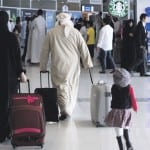By Neil Halligan – ArabianBusiness.com
 It’s the fastest growing sector of tourism in the world and countries are slowing beginning to tap into it.
It’s the fastest growing sector of tourism in the world and countries are slowing beginning to tap into it.
Halal tourism will grow at a rate of 6 percent per annum, according to TCA Abu Dhabi – double the global tourism industry growth – and there’s hardly a week goes by when some country or hotel company isn’t announcing how they plan to attract more Muslim tourists.
The State of the Global Islamic Economy 2014/2015 report, produced by Thomson Reuters in collaboration with DinarStandard, said the global Muslim travel market was worth $140bn in 2013 (excluding Hajj and Umrah, which alone is worth $16bn), which represents 11.5 percent of global expenditure.
The same report predicts that the segment is expected to be worth $238bn in 2019 and represent 13 percent of global expenditure.
Given the impressive figures involved, and potential growth predicted in the next five years, there’s little wonder why more and more destinations are latching onto a growing sector of the industry.
While the UAE has been at the forefront, it’s still ranked third in the most recent Global Muslim Travel Index, behind Turkey and Malaysia.
Reem El Shafaki, Senior Associate, Halal Lifestyle Markets with growth strategy research and advisory company, DinarStandard, says Malaysia, where 60 percent of the population are Muslim, is attracting a variety of tourists.
“Malaysia is the number-one most popular destination for Muslim tourists and it’s not shy about touting its Muslim-friendliness,” says El Shafaki. “It is now even focusing on becoming a medical tourism hub for Muslim patients. At medical tourism centres, female patients can be treated by female doctors and there are prayer facilities and copies of the Quran available.”
She says Indonesia, which is another popular destination for Muslim travellers, has a large number of Sharia-certified hotels, restaurants, travel agencies and spas.
Turkey, where 98 percent of the population are Muslim, has been a market leader in Muslim-friendly resorts, according to Ufuk Seçgin, marketing manager with HalalBooking.com, a website dedicated to providing tourism and city breaks for the halal industry.
“It started off 20 years ago in Turkey, when the first halal beach resort opened its gates. It has been a big success story and now we’ve got 50 to 70 halal beach resorts across Turkey and only this year four more beach resorts opened in the Antalya-Alanya region in south Turkey and this is due to the massive demand, domestically and also from outside,” Seçgin says.
El Shafaki says places like Adenya Hotels and Resorts have facilities dedicated to women only, like the swimming pools, spas, and a women-only beach.
“The resort offers halal food and they have no alcohol on their premises. In Turkey segregated beaches are becoming a trend; Antalya opened a women-only beach and more public segregated beaches are expected to follow,” she says.
In the UAE, more and more halal-friendly hotels are emerging as the market develops further.
The CEO of Hospitality Management Holdings, the first alcohol-free chain of hotels in the Middle East, says the halal-friendly environment is part of the company’s culture and DNA and not simply a business decision.
“Our primary objective is to offer our customers a safe and healthy environment be it corporate or leisure travellers,” Laurent Voivenel says. “Contrary to popular belief, a dry hotel can be as lively and vibrant as any hotel. We have got an international mix of corporate and leisure travellers and majority of these are from the non-Muslim Western world.”
He says a lot of companies prefer to put up their executives in dry hotels, for the same reason that tourists favour the dry hotels.
“A whole lot of leisure travellers chose to stay in a safe environment and are not necessarily looking for alcohol. One of our key segments is no doubt families and women travellers who feel a lot more at ease in our hotels since there are no nightclubs or alcohol,” Voivenel says.
He says in order to market a destination or property being halal-friendly, it means being able to cater for non-Muslims as well.
“This [halal-friendly] would mean that while there are ample choices for halal travellers, be it in terms of spirituality, food, accommodation, entertainment, financial institutions, code of conduct and dress code, there are options for non-halal consumers too. This widens the appeal of a destination diversifying its source markets,” says Voivenel.
El Shafaki says when marketing a destination as halal, the focus should be on what the location has to offer to travellers, such as natural beauty, sight-seeing, adventures and shopping opportunities.
“Aspects such as halal food, prayer spaces, and other aspects of accommodating Muslim needs should come secondary in the marketing communications. Muslim travellers, like any other traveller, want to visit destinations that have something unique to offer, and when their needs are being met, that makes them comfortable and allows them to enjoy their stay, but it isn’t the reason they select a destination,” she says.
“For example someone who is vegetarian or vegan will not select a destination primarily because it accommodates his or her dietary needs, but when they travel to a destination that does, they are comfortable that their needs are being accommodated, which makes their stay more enjoyable, and vice versa,” she adds.
El Shafaki says there’s a growing trend towards ethical tourism and experiential travels and travel companies should try to differentiate themselves by providing unique experiences that are Muslim-friendly, like adventure travel, wildlife tours and ‘voluntourism’.
“One company that combines socially responsible and experiential trips that are Muslim-friendly is Holiday Bosnia, which is a UAE-based company that offers philanthropic trips to Bosnia in which travellers interact with the local community and are able to partake in charitable work,” she says.
Aside from the Middle East, El Shafaki says hotels in Europe have shown an eagerness to attract wealthy GCC travellers, who account for 31 percent of the total Muslim travel expenditure, although they represent only 3 percent of the Muslim population, according to the State of the Global Islamic Economy 2014/2015 report.
“The Dorchester in London provides Arabic-speaking staff to accommodate wealthy GCC travellers. They alter the shift times of operational staff during Ramadan to accommodate late-night requests of fasting guests. During the day, housekeeping staff were instructed not to service the rooms of fasting guests to avoid disrupting their sleep,” she says.
“The JW Marriott Grosvenor House, also in London, caters to Arabic and Asian weddings that are usually gender-segregated. The hotel conducts cultural awareness training to all its front-line staff on social protocols related to the Muslim market. The hotel’s suites include majlis-style lounge rooms that are gender separated. Their menu includes Middle Eastern dishes, and they have Lebanese and Egyptian chefs.
“In Switzerland, the Tschuggen Grand launched what it calls its ‘Arabian Fairytale’ package targeting Ramadan travellers. The hotel provides traditional halal food, separate men’s and women’s prayer rooms, room service that is respectful of Ramadan hours, Arabic-speaking staff and — for an additional fee – a private butler service,” she adds.
Other countries like Japan, have identified the need to cater for Muslim tourists. In preparation for the 2020 Olympics, Japanese airports are adding prayer rooms as well as halal restaurants.
“The country has also published a Muslim-friendly guide that provides information on halal restaurants as well as prayer spaces. It is also conducting seminars to educate the tourism industry on how to cater to Muslim needs,” says El Shafaki. “Thailand is also trying to appeal to Muslim tourists and has opened a series of gender-segregated halal spas. The Thai resort city of Pattaya has opened Islamic prayer rooms in nearly all of its top shopping centres. Having Islamic heritage sites is a plus, which is the case in Andalucía in Spain,” she adds.
The growing demand, however, needs more destinations, according to Seçgin, says he spent a lot of time in Abu Dhabi recently, meeting with owners of potential new venues.
“One of things we’re working on is to try and encourage other destinations like Abu Dhabi to start opening more beach resorts which are dedicated for this customer group. The current existing hotels are mainly city hotels which have got some provisions, such as no alcohol and halal foods, and maybe an outdoor swimming pool on the rooftop which will open only for ladies maybe two or three hours a day, which is something, but it’s the not the proper full blown beach resort that we see in Turkey, which have several outdoor pools segregated between men and women, they’ve got separate spa facilities exclusively for ladies,” he says.
Abu Dhabi’s tourism office wants to build up the emirate as a halal travel destination, Seçgin says.
“They are working hard with the hotels and everyone involved travel industry to build it as a halal destination. It has got big, big potential.
“I see massive potential because the UAE on its own has got very good connectivity to the world through Dubai and Abu Dhabi airports. You also have a lot of tourist attractions,” he adds.
Seçgin says making an existing hotel halal-friendly is possible through minor adjustments – building another swimming pool for ladies, and cordoning off an area for women in a subtle way.
He says they’ve worked with a number of hotel companies on ensuring they are halal-friendly, like Shaza Hotels, a luxury hotel operator that focuses on authentic Arabian hospitality while being value-driven, and therefore appealing to both Muslims and non-Muslims alike. He says Shaza plans to open ten resorts across Middle East, North Africa and Turkey.
“We facilitated that they could visit some of our top-selling properties, just so they understand what is required, and what are the main things to think of when they build these properties. And we would encourage others [hotel operators] to come and visit as well, because it’s an eye-opener. When they come and see it, and see what customers enjoy most, they will understand that it doesn’t take a lot to make this happen and to have a very lucrative business,” he says.
And it’s the financial reward that has encouraged a lot of operators to consider creating halal-friendly venues, Seçgin says.
“The reason people are investing in these hotels is because the margins are higher at the moment, because there’s high demand and not enough supply and therefore the rates for these hotels are higher than the normal tourism hotel. I would say it’s probably around 30 percent difference,” he says, adding that customers are willing to pay more for the halal offerings.
That’s good news for those that are in the market, like Abu Dhabi-based Jannah Hotels and Resorts, which has just opened its new Jannah Burj Al Sarab Hotel, as it looks to capitalise on the growing market. It also has plans to open a three-star hotel in Dubai in late June 2016, with further expansion planned across the UAE.
Voivenel says HMH will look to grow its footprint significantly in the next five years, and build on its strengths in the market.
“The biggest growth in the halal tourism is being seen in the mid-market segment. And our strategy is to expand aggressively in this segment with a target of boosting our existing portfolio of hotels by 30 percent over the next five years. This will include having a hotel in every GCC country while doubling our portfolio in the UAE and Saudi Arabia. We also have a strong interest in the booming Asian markets such as India, Indonesia, Malaysia and China,” he says.
Abu Dhabi, however appears to be the focus for halal-friendly hotel development at the moment. In October this year, the emirate will host the World Halal Travel Summit and Exhibition.
“Abu Dhabi is working with Muslim-focused travel agencies and hotels to test the market and are working to package post-Hajj and post-Umrah breaks, given their proximity to Makkah,” says El Shafaki.
It will be interesting to see over the next five years how hotel operators across the region capitalise on the fastest-growing sector in tourism, and take their share of a lucrative end of the market.



